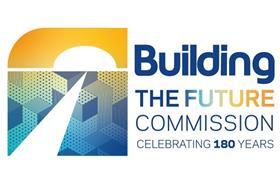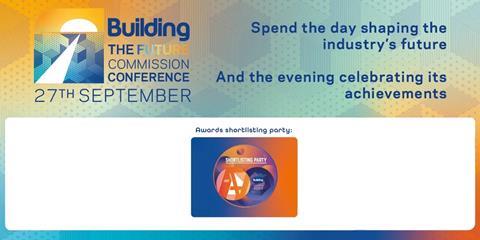There are so many vibrant, young, energetic new practices and individuals shaping the narrative of what is good in our profession. We must protect and nurture them, writes Sadie Morgan

As business and practice leaders, we spend a lot of our time talking about the importance of “collaboration”. We spend less time, however, defining exactly what it means.
For much of my career I have been focused on a specific aspect of collaboration that I believe still needs more attention – that of mature leaders and practitioners pulling in and mentoring emerging figures in the profession.

I have actively worked towards this in my varied roles. One example was in 2018, when I made the case for the National Infrastructure Commission’s young professionals panel.
Sixteen young architects, engineers, designers and energy specialists were selected to ensure that the next generation would have a strong voice in infrastructure decision-making. This felt like the only way to steer things forward in national development, both logically and equitably.
The planet needs more attention, the industry needs more equity, and the way we work needs to be more balanced
Young voices are gaining ground organically. Right now in the architecture and construction industry, it feels as though we are living a moment of rejuvenation – there are so many vibrant, young, energetic new practices and individuals shaping the narrative of what is good in our profession.
These new faces and forces have come into the fold to usher in a message that the old ways are simply no longer working. The planet needs more attention, the industry needs more equity, and the way we work needs to be more balanced.
On all counts, these new voices have been unbounded in naming and calling out the things that need to be changed. This is all positive action. But the question that comes to my mind is: can the intentions of a new professional cohort be heard without meaningfully joining forces with the old guard?
My gut answer is to say… they can’t. Because there is no way to wipe away the history of how any profession and its players have evolved over time. And, even if that were possible, my next feeling is that… they shouldn’t.
While veterans have always needed the innovation of new minds, emerging practitioners do need the solidarity of established figures. Indeed, there have been examples of newly emerging practices that have come into such huge demand that they have fallen prey to over-exposure, resulting in being so stretched on their workload that they are unable to deliver good enough results.
When selecting smaller, under-represented practices, established clients and collaborators need to help them to succeed without swamping them. If not, they risk unperforming and forfeiting a chance at being hired again. Emerging and established practitioners should support each other to ensure that this does not happen.
The section of our profession’s workforce most likely to leave practice has been shown to be primarily women and people from BAME backgrounds, which is problematic for countless reasons
When joining forces, established and emerging practitioners have the biggest capacity to diagnose and solve past, ongoing and future challenges that face their shared vocation. So, how can we take up inter-generational and inter-level collaboration more earnestly?
Despite new voices being seemingly on the rise in the public arena of the architectural industry, the figures around how many young architects want to stay in the profession are not as sturdy as we might hope they would be. Moreover, the section of our profession’s workforce most likely to leave practice has been shown to be primarily women and people from BAME backgrounds, which is problematic for countless reasons. We already know some of why this is happening; my contention is that we cannot wait to get the full picture before we try to change it.
Part of the problem with achieving success as a young practitioner, especially if you are from a minority background, is a shortage of the right connections, social capital and opportunities to bring ideas, talent and skills to the table. As leaders, managers and senior workers, we must help to share whatever gains we had made in this respect with our newer colleagues. The way to do this is straightforward: simply give people who are at early stages in their career a chance for exposure.
For a couple of years now, beginning in the summer of 2022, I have organised a series of networking soirees that would act as an alternative addition to the design industry’s regular events calendar – a gathering that would specifically help young women to meet and connect with leading female figures where they otherwise could not.
The latest event saw around 100 women from different backgrounds come together to share in a night of food, drink and conversation. The aim of the evening was not just for women in the industry to forge connections, but also to build confidence with both leaders and peers in an approachable, embracing setting that positions everyone on an equal social footing. The format speaks very much to my character; more than anything, I wanted everyone to share an evening of fun together.
The onus to strengthen ties between different generations and cohorts of practitioners rests equally on the young or emerging and as it does on the seasoned expert
This is just one way that I want to overtly define what collaboration could look like. I plan to build on it.
As a practitioner who has had over two decades of experience building relationships, projects and value within the built environment, I also want to acknowledge that the onus to strengthen ties between different generations and cohorts of practitioners rests equally on the young or emerging as it does on the seasoned expert.
The latter must work hard to pass on the fruits of their legacy with grace and authentic generosity. But the former must be willing to work hard, always being cognisant of the true grit and force that it has taken for those who came before them to make their mark in the world of work.
Sadie Morgan is a co-founding director of dRMM, chair of the Quality of Life Foundation and a design advocate for the GLA
Join us for the Building the Future Commission Conference on 27 September - buy your tickets here

Join the Building the Future Commission Conference in Westminster on 27 September to hear from leading figures across the construction industry and find out more about the work of the commission.
The day will include panel debates on net zero, digital transformation and building safety as well as talks from high-profile keynote speakers on future trends and ideas that could transform the sector.
There will also be the chance to feed in your ideas to the commission and to network with other industry professionals keen to share knowledge.
On the day, we will also be announcing the winner of our Future Thinkers’ Award, which will go to the most innovative idea submitted in our competition for professionals under 35-year-olds wanting to improve the built environment. The deadline for entries is Friday 18 August, and you can submit your entries by emailing buildingfuturecommission@building.co.uk
About the commission
The Building the Future Commission is a 12-month project looking at radical and challenging ideas that could help transform the built environment.
The campaign aims to tap into innovative ideas, amplify them and be an agent for change.
The major project’s work will be guided by a panel of major figures who have signed up to help shape the commission’s work culminating in a report published at the end of the year.
The commissioners include figures from the world of contracting, housing development, architecture, policy-making, skills, design, place-making, infrastructure, consultancy and legal. See the full list here.
The project is looking at proposals for change in eight areas:
- Education and skills
- Housing and planning
- Energy and net zero
- Infrastructure
- Building safety
- Project delivery and digital
- Workplace culture and leadership
- Creating communities
>> Editor’s view: And now for something completely positive - our Building the Future Commission
>> Click here for more about the project and the commissioners
Building the Future is also undertaking a countrywide tour of roundtable discussions with experts around the regions as part of a consultation programme in partnership with the regional arms of industry body Constructing Excellence. There is also a young person’s advisory panel.





























No comments yet